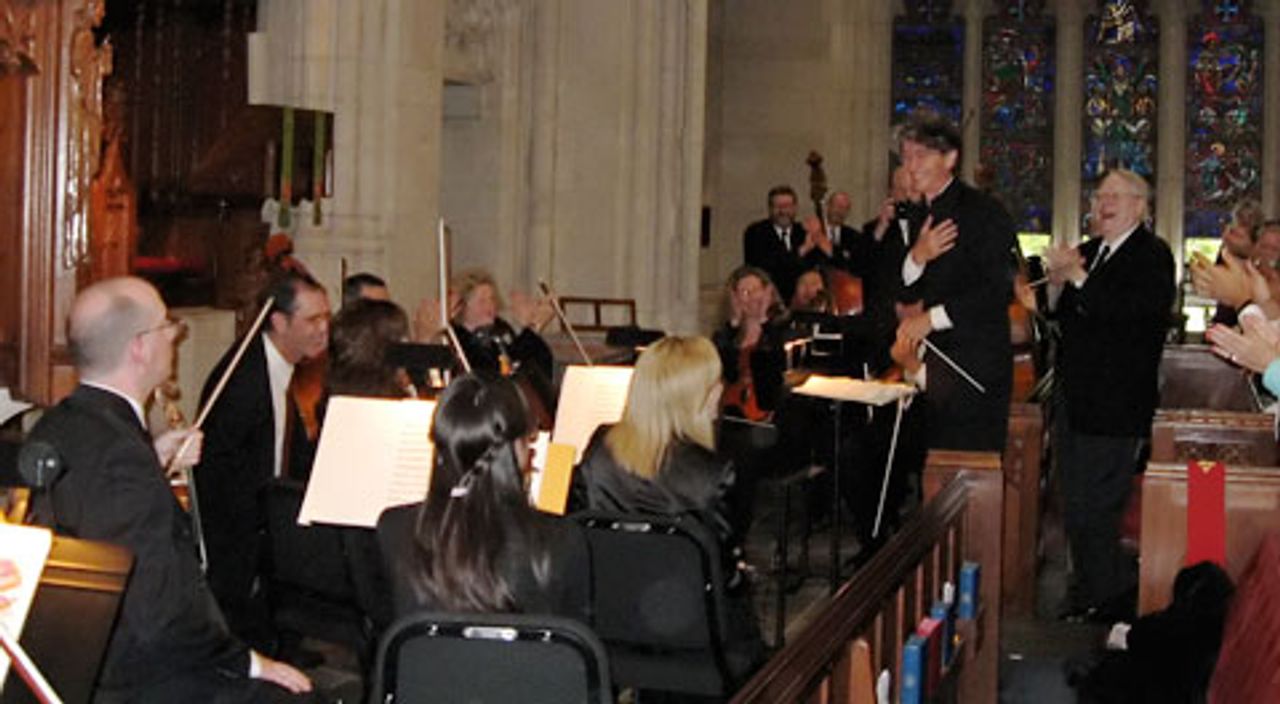Facing falling private contributions, declining ticket sales and the erosion of its endowment, the Detroit Symphony Orchestra is attempting to impose unprecedented concessions on orchestra members.
As we go to press, no talks are scheduled between the DSO and representatives of symphony musicians in advance of a September 23 deadline for a possible strike or lockout.
Under terms of so-called Proposal B, which management is threatening to implement if no agreement is reached, orchestra members face a more than 30 percent pay cut, reduced health care benefits and other concessions, including a permanent reduction in the size of the orchestra.
The players union, the American Federation of Musicians, has responded with its own concessions offer, only slightly less drastic, proposing a pay cut of 22 percent with partial restoration in the third year of the contract. In either event the survival of the DSO as a top ranked US orchestra is in question.
In recent weeks members of the Detroit symphony have reached out for public support, performing concerts on September 11 and September 19 at Kirk in the Hills in the Detroit suburb of Bloomfield Hills. The September 11 concert featured Uriel Segal, of the Jacobs School of Music, Indiana University, with concert master Emmanuelle Boisvert playing the Mozart Violin Concerto No. 4 in D Major, K 218.
The September 19 concert featured Grant Cooper, conductor of the West Virginia Symphony, with the orchestra performing selections from Bach, Mozart and Schubert. The services of the orchestra members, stagehands and guest artists were donated.

The crisis facing the DSO is severe, but not unique. All the major arts institutions in Detroit—including the Michigan Opera Theatre and Detroit Institute of Arts—face severe financial pressures. Symphony orchestras across the US have been forced to carry out cuts, including the elimination of concerts and the imposition of pay reductions. Meager public funding has been further reduced while private donations have fallen.
The attack on art and culture goes hand in hand with the ripping up of vital services for millions of working people. In Detroit, Democratic Mayor Dave Bing is proposing to cut off public services and close down whole sections of the city. Dozens of schools have been shut down while city workers face layoffs and pay cuts. The devastating fires that swept through Detroit two weeks ago demonstrated that whole sections of the city have already been abandoned, deprived of vital services such as fire protection.
The attack on the Detroit symphony musicians is a focal point of a nationwide assault on art and culture, which corporate America says it can no longer afford. A September 17 article in the Wall Street Journal by Terry Teachout, its drama critic, is titled, “Disaster in Detroit.” Teachout asks, “Can a once-great city that is now the size of Austin, Texas, afford a top-ranked symphony orchestra with a 52-week season?” Noting the financial difficulties facing other cultural institutions such as the Detroit Institute of Arts and Michigan Opera Theatre, he declares that it wouldn’t be “complacent to admit Detroit may not be able to afford the DSO—or that the city’s ‘unwashed masses’ won’t lose any sleep if the orchestra is forced to close.”
Calling the resistance by symphony musicians to the massive concession demands “a classic symptom of the cultural-entitlement mentality,” Teachout continues, “Any economist can tell you what has happened: In Detroit, being a classical instrumentalist is no longer an upper-middle class job.”
The Journal article aroused anger among DSO players, who see their stand as part of a broader defense of art and culture. Kenneth Thompkins, a trombonist for the Detroit Symphony and one of the players’ spokesmen, told the WSWS, “I think he fails to realize that the DSO is one of the great institutions in Detroit. We consider ourselves workers like anyone else. What we are asking for is not an entitlement, it is a right.”
The WSWS spoke to performers and supporters at the September 19 concert on their reaction to the threat facing the DSO.
Dolores Reaves came to show her support for the musicians. She told the WSWS, “I think that it is sad that the symphony is not being supported. Any time we lose something it is not good. We should be adding on, not eliminating the finer things.”
A violinist called the vilification of the musicians by the Wall Street Journal “deplorable.”
 Laurie Goldman
Laurie GoldmanLaurie Goldman, another violinist, called the remarks of the Journal columnist “venomous.” “It could happen,” she said, adding, “The destruction of the orchestra would be tragic for the city. The DSO is one of the things that makes Detroit great.”
She explained the enormous work and sacrifice required to be selected by the DSO. “I have been a member of the DSO for 19 years. It took me two years of auditioning. Before coming to the DSO I played in the Toledo symphony.
“I went to the University of Michigan and studied biology because I wanted something practical, but it ended up that music was what I loved. It took a lot of sacrifice on the part of myself and my family. I know people who gave up a lot more to become a musician.”
 Grant Cooper
Grant CooperGrant Cooper, the conductor of the West Virginia Symphony, explained why he donated his time to conduct the concert at Kirk in the Hills. “I really think music is important. It is important to correct the image that it is just another aspect of culture. It is much more than that. As we search for a way to understand other cultures we get a view into other people through music. I think it is essential if humanity is to go forward.”
Subscribe to the IWA-RFC Newsletter
Get email updates on workers’ struggles and a global perspective from the International Workers Alliance of Rank-and-File Committees.
